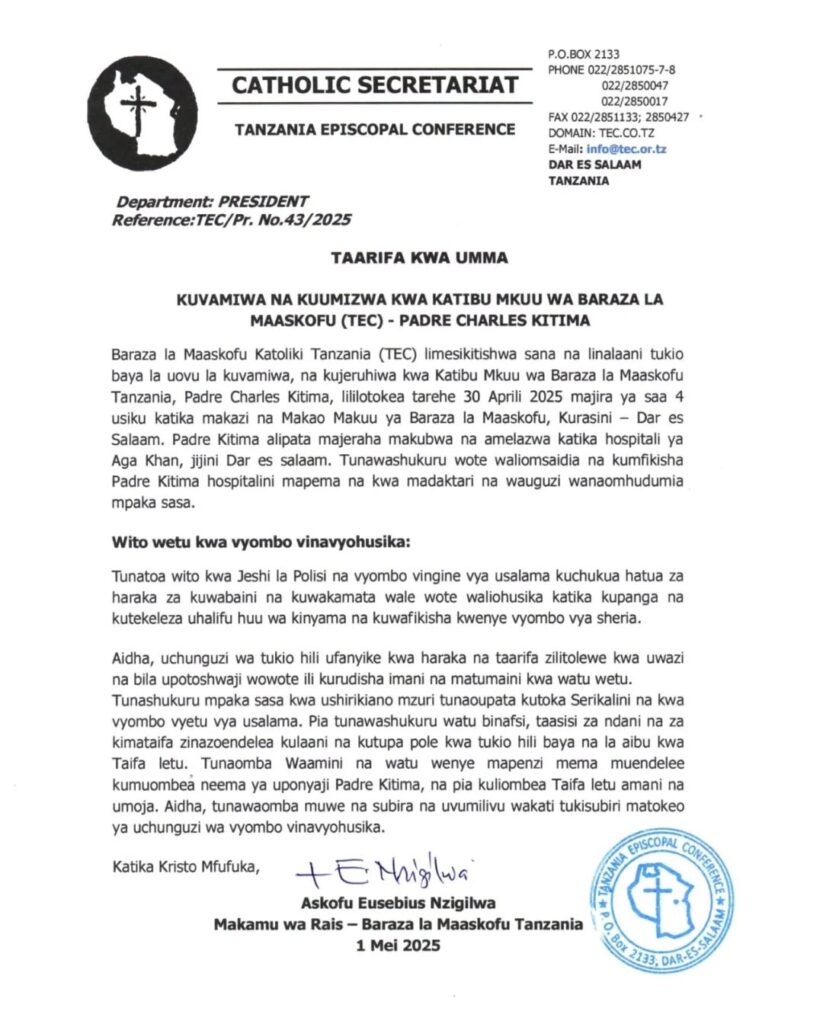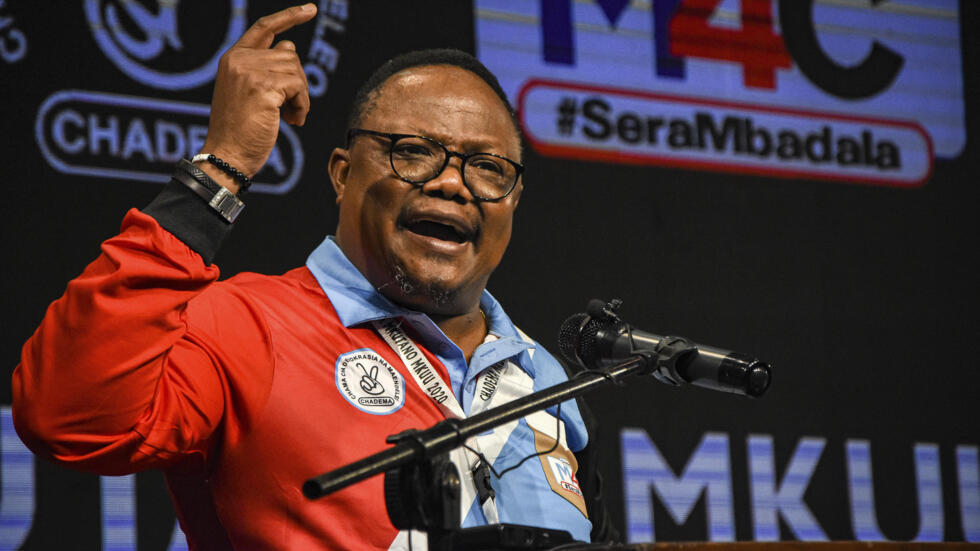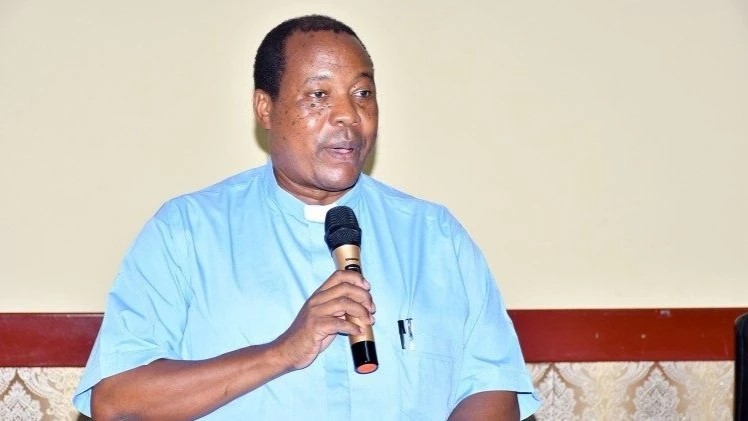By Paschal Norbert
DAR ES SALAAM, MAY 2, 2025 (CISA) – The Secretary General of the Tanzania Episcopal Conference (TEC), Fr Charles Kitima, was brutally attacked on the night of April 30 within the TEC headquarters in Kurasini, Dar es Salaam. He is currently recovering at the Aga Khan Hospital, as the country reels from the shocking assault that has sparked widespread condemnation and urgent calls for a thorough investigation.
According to police reports, the attack occurred shortly after Fr Kitima had finished a meeting with other religious leaders. He reportedly went to the Secretariat’s canteen around 7:00 pm and remained there until approximately 10:00 pm, when he was assaulted with a blunt object by two unknown individuals inside a restroom.
The city’s special police commander, SACP Jumanne Muliro, confirmed the arrest of one suspect, Rauli Mahabi, a resident of Kurasini, in connection with the incident. However, questions remain about the suspect’s identity and background, with critics noting a lack of transparency from the authorities.
“A thorough probe is ongoing, and legal action will be taken swiftly against the perpetrators,” said SACP Muliro.
In a statement released by the TEC and dated May 1, the Bishops expressed deep shock and dismay at the attack.
“The Tanzania Episcopal Conference (TEC) is deeply saddened and strongly condemns the evil act of assault and injury inflicted on the TEC Secretary General, Fr Charles Kitima,” read the statement signed by Bishop Eusebius Nzigilwa, Vice President of TEC.
The statement further revealed that Fr Kitima “sustained serious injuries and has been admitted to the Aga Khan Hospital.” TEC expressed gratitude to those who helped rush the priest to hospital and to the medical staff caring for him.

Church and State: A History of Friction
The attack on Fr Kitima comes at a time of rising tension between religious leaders and the state. TEC has been vocal about growing authoritarianism, electoral injustice, and human rights violations under the current administration of President Samia Suluhu. In recent months, Fr Kitima has emerged as a leading voice for social justice, declaring that “no one can silence the Church” – a bold challenge to those seeking to muzzle dissent.
This latest confrontation evokes memories of past clashes between TEC and the state. In 2018, during the presidency of the late John Magufuli, TEC issued a scathing pastoral letter on the erosion of human rights and suppression of dissent.
The then-Secretary General, Fr Raymond Saba, had his passport revoked by the government and died under unexplained circumstances months later. Fr Kitima has carried forward that legacy of prophetic witness, consistently condemning corruption, state violence, and abuse of power.
The attack, which occurred just five months ahead of Tanzania’s General Elections scheduled for October, amid mounting criticism of the electoral environment. The main opposition party, CHADEMA, has already declared a boycott, citing electoral malpractice, the lack of reform, and compromised institutions.
Religious leaders have repeatedly urged the government to guarantee a peaceful and credible process. Yet, some CCM loyalists accuse clergy of crossing into political territory. In response, Church leaders insist that the fight for justice and peace lies at the heart of their mission.
Religious leaders from various faith communities have joined in condemnation of the attack. Pastor Moses Matonya, Secretary General of the Christian Council of Tanzania (CCT), said the incident tarnished the country’s image.
“This is a crucial time for the country, and citizens must be able to express themselves freely without fear,” he said.
Sheikh Nuhu Mruma, Secretary General of the Tanzania Muslim Council (BAKWATA), added: “This act is shocking and unacceptable. We urge authorities to investigate and take appropriate legal action.”
The TEC leadership rejected suggestions that Fr Kitima was at a drinking establishment at the time of the attack. TEC President Bishop Wolfgang Pisa stated that the location was a restaurant within the compound, not a bar.
“There is no bar at the site; it is a restaurant,” he said, denouncing insinuations that misrepresented the nature of the venue.
The Church also appealed to law enforcement to act decisively and transparently.
“We call upon the Police Force and other security agencies to take swift action to identify and arrest all those involved,” the TEC statement urged. “Furthermore, the investigation into this incident should be conducted promptly, and information should be shared transparently and without distortion, in order to restore trust and hope among our people.”
Civil society leaders also voiced concern. Boniface Mwabukusi, president of the Tanganyika Law Society (TLS), described the incident as “brutal and life-threatening,” affirming that it was a “deliberate attempt” on Fr Kitima’s life.
Political leaders from across the spectrum have echoed these concerns. Chadema Mainland vice-chairman John Heche called it an “assault on free expression,” while CCM Mainland vice-chairman Stephen Wasira demanded “a thorough investigation and accountability.” ACT-Wazalendo party leader Dorothy Semu termed the act “shocking and alarming,” adding, “These acts undermine peace, unity and the country’s social fabric.”
Political Backdrop and Election Tensions
Meanwhile, political tensions in the country have further escalated following the arrest of prominent opposition leader Tundu Lissu. On April 9, 2025, Lissu was arrested on charges of incitement and treason after calling for electoral reforms during a rally in Mbinga. His arrest triggered a wave of outrage both locally and internationally, with human rights organizations and diplomatic missions condemning it as part of a broader effort to silence critical voices ahead of the upcoming elections.
Just three days later, on April 12, the National Electoral Commission disqualified Lissu from participating in the 2025 Tanzanian General Election, a move that opposition leaders and civil society groups have called politically motivated and unconstitutional.

Lissu, who previously survived an assassination attempt in 2017, had returned to Tanzania earlier in the year to revive CHADEMA’s campaign and pressure the government for urgent reforms to the electoral framework. His detention and disqualification are the latest in a series of actions targeting opposition figures, who continue to face harassment, restricted movement, and frequent police summonses.
Several CHADEMA and ACT-Wazalendo members have reported threats and disruptions to political rallies, with some venues abruptly canceled by authorities on questionable grounds. Civic organizations have warned that these actions threaten the legitimacy of the electoral process and the country’s democratic foundations.
